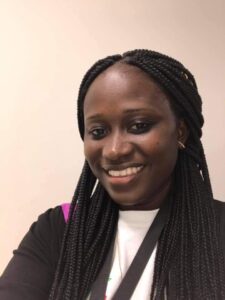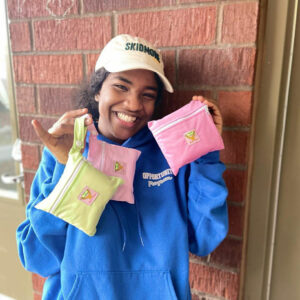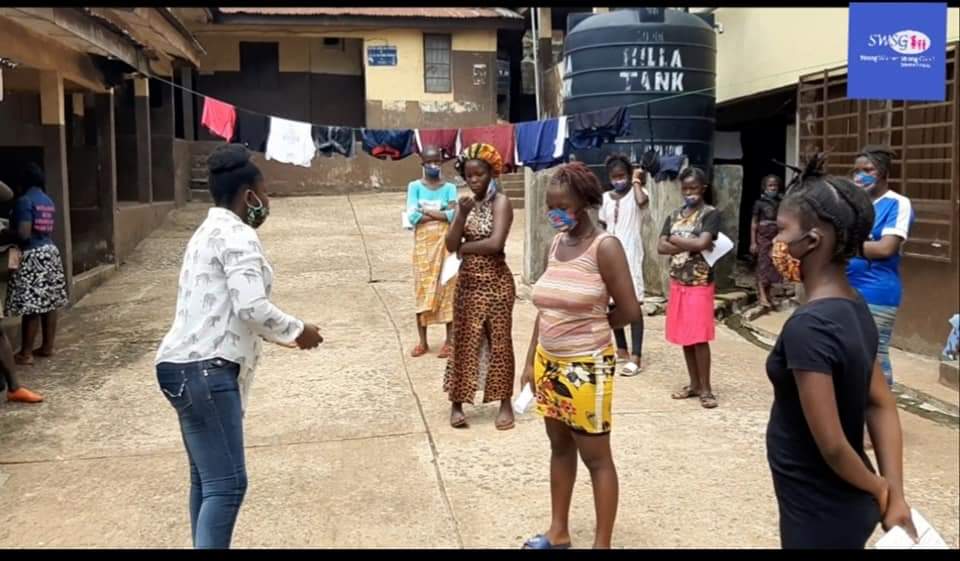Young and naive at age 11, I started menstruating. I had no idea what to do. No one had spoken to me about menstruation as it was regarded as a shameful taboo topic. I got back from school on a hot Wednesday afternoon, tired and hungry. I was menstruating for the first time. There wasn’t a single drop of water at home. Already feeling drained and disgusted, I had to go look for water to clean myself up and wash my “pass pisis”, the cloth many women and girls used because pads were unaffordable and inaccessible. That experience on the third day of my first menstrual cycle; and the reaction I got from a woman about my mother’s age (which I will say more about later) was probably the most humiliating of my childhood. In this reflection I am writing for Engage Salone, I am sharing my experience with period poverty in the first person. I am also bringing in perspectives from other women who have been working on the issue in Sierra Leone.
Back to that Wednesday afternoon at New England in Freetown. There was a very long queue at the stream. At the time, you could not even discuss menstruation publicly. So, I could not ask those ahead of me to allow me to jump the queue. Well, they probably would not have even tolerated the idea because water points in Freetown are places of competition and contention, with rowdy quarrels and fights. So, I found a boulder where I sat, as I waited for my turn. I was tiny. The underwear barely fitted, and it did not hold the menstrual cloth in place. The cloth shifted and the unthinkable happened! I soiled myself and left traces of blood on the rock I was sitting on. The reaction from one woman left me shocked and ashamed.
“Na ous dorty en smell posin cam lef dis nasty na ya?”, a woman, probably my mother’s age, yelled. She called me dirty, and smelly and for her, menstruation was “nasty”. This was at Mo-Jabbie, a stream that became a communal water point at New England. Those words stuck with me and many years on, they inspired me to make the fight against menstrual poverty and shaming a mission.
The behaviour of the woman at the stream was appalling. But unfortunately, it was a widely held attitude towards menstruation. Women in our society were conditioned to think and treat menstruation as disgusting and shameful—something that needed to be hidden away. And even the naïve 11-year-old me, who was experiencing menstruation for the first time, was not shown the compassion, care and support that I needed.
Obviously, I was not the only girl experiencing what I went through. There were many more girls like me. That phase of my life was a rude awakening to the harsh realities of being a girl in societies like ours. I suffered from a lack of knowledge, support and of course, poverty—not having access to pads. The tender me now had a new responsibility—a time of the month when I had to be feeling ashamed and humiliated as I washed my “pass pisis”. My needs were not a priority and the fact that the family that raised me also struggled to make ends meet, also meant that pads for Mariatu were definitely not an option. So, this was my life as a girl for a very long time.
Determined to liberate myself from the menstrual poverty that had brought me infections, discomfort and taken a psychological toll on me, I started saving to start a business. It took me three months to save 17, 500 (Old) Leones. I started a “butterscotch” business. I made milk candies which I sold in school. The profit enabled me to buy packets of menstrual pads which I used for the very first time. Selling from class to class also meant that I missed some lessons. But I felt the power of being able to take care of my own menstrual hygiene needs and since then I took control of my bout with period poverty, and it only got better as I started earning from volunteer stipends and other small jobs that I did.
My newfound convenience did not cause me to forget that there are many girls out there who are experiencing what I went through. So, I was determined to make my own little contribution to addressing the widespread problem of period poverty in a country of mostly poor people. A few months after graduating from Fourah Bay College, I started Strong Women, Strong Girls (SWSG), an initiative that helps young girls meet and benefit from the experiences of women in their communities and around the country, with the aim of mentoring and supporting them. Menstrual hygiene is a big part of what we do at SWSG as we get people to donate menstrual kits to young, underprivileged girls in different parts of the country. Since 2020, we have reached more than 700 girls in Sierra Leone, more than 200 of whom have become champions of menstrual hygiene, sexual and reproductive health and rights around the country. This is my way of talking back to the woman at the stream who called me dirty and referred to menstruation as nasty.
When I spoke to menstrual hygiene and girls’ rights advocate, Janet Hawa Koroma, she told me how period poverty can be debilitating, affecting the health, emotional and mental wellbeing of girls around the country. Like me, Janet has also had a challenging past, growing up as a child with little or no information on menstrual hygiene management. That has been the driving force behind her work on menstrual hygiene. She believes that girls must menstruate in dignity. Period shaming and poverty are the “causes of many health issues in the lives of girls, especially those from low-income families”, Janet told me and I totally agree because I have lived it.

According to UNESCO’s Puberty education & menstrual hygiene management handbook, it is estimated that one in four women and girls struggle to buy menstrual supplies each month due to lack of income and one in 10 girls in Africa will miss school when they have their period and miss approximately 10-20% of school days. Missing days at school can lead girls to drop out altogether, putting them at risk of child marriage and getting pregnant at a younger age.
Haja Isatu Bah is an environmentalist and social entrepreneur. She is also the founder of Uman4Uman, a small business that produces reusable pads for women and girls in Sierra Leone. There are a lot of similarities and differences between my experience with my first period and Isatu’s. She was fortunate to be able to afford pads and she also had access to information. What she had no control over were her oversized pads which, one day, slid to one end, and caused her to soil her chair in school. Like me, she was also 11 at the time and that was a day she would never forget, she told me.
According to Isatu, the problem of period poverty in Sierra Leone is bigger than we think, no matter how far we try to understand it. This is how she puts menstruation into perspective:
“First off, half of our population is women and at a certain age we start seeing our period and it’s not something we choose. It just happens and we could see it for decades before we could reach menopause.”
For girls, the picture is even grimmer, Isatu said.
“Now we live in a country where 2 out of 5 girls miss school when they are on their periods and we know that not every girl in Sierra Leone is in School, so we don’t even know the level of period poverty among dropout girls, we do not know the period poverty among single mothers, persons with disability and other sets of women, girls who are not accounted for.”
There are a lot of people working on period poverty today. When I started menstruating at 11, there was no one to look up to for information or even assistance. Today, we are all doing our part to make it easier for the many girls who suffer from period poverty, shame and lack of information. What has not changed though is the cost of menstrual kits. The cost continues to go up and some of the big brands are becoming unaffordable. This means that even organisations like mine that donate pads cannot keep up. This points to the sustainability challenge of the wider menstrual hygiene assistance project. For as long as the cost remains high, girls and their families will continue to struggle to afford pads. The cost of menstrual pads and their impact on the environment are a concern for Isatu too, and that is why she is making reusable pads.
“It is crazy that the [common brands] have only ten pads in a pack and are sold at nothing below NLe 20. As a matter of fact, some girls see their periods between 7 to 9 days, and if they are to change their pads 3 to 4 times a day, which is the hygienic thing to do, it means they are going to multiply 7 or 8 by 4, which is about 28 to 32 pads. That is 3 to 4 packs per month…how many girls are able to afford this?
“Many girls are only limited to a pack pad per month, which causes them to use only one pad a day, and the rest they will tear a piece of cloth and use it. Some use other things like banana skin, tissue, plastic, etc. This eventually turns into a cycle because when they, the girls, also give birth to their children, the same thing continues.
Isatu believes that we live in a cycle of period poverty, and we need one person to break it to get awareness. “We need tons of resources to keep the conversation going,” she told me.
Isatu’s reflections opened my eyes to see the big picture as I think of the 52 percent of women in the country. I cannot stop to wonder how many of them can conveniently afford menstrual products like pads and tampons. There are the non-physical needs—the information and emotional support that women need when they go through menstruation. We are not only dealing with poverty in terms of menstrual products, but we are also poor by way of information, knowledge and support as far as menstruation is concerned.

Another challenge that is a major obstacle to addressing period poverty, shame and all the related problems is the fragmentation in our interventions. When I started SWSG, I wanted to help solve a problem. We have been able to make an impact with our interventions but I am becoming increasingly aware of the need for cooperation among all those who work on this issue and what we can achieve together. Small interventions and on-off donations here and there are not a bad idea but they take us nowhere. Initiatives like First Lady Fatima Bio’s are great in raising awareness but quite frankly, a packet of sanitary pads to a girl from a poor family is a drop in the ocean. Let us go back to Isatu’s maths. For some girls, it is 7 to 8 days of menstruation, and they would change their pads 3 to 4 times a day. That is 28 to 32 pads, which also means 3 to 4 packs of pads a month.
For impact and sustainability, there is a need for more strategic thinking in national initiatives such as the First Lady’s. We should be asking ourselves whether we are solving the problem or we are just addressing needs on a one-off basis. People in positions of power like Madam First Lady have the means to influence policy to bring a more holistic, impactful and sustainable solution to period poverty.
Isatu believes that “it is amazing when everybody is unanimously trying to address period poverty, it’s a feminist initiative”. Like me, she also believes that there are certain things that can be done differently.
For Isatu, the fragmentation and sustainability questions need to be addressed and one way she thinks we can do that is to work together and take a more people-led approach that gives the girls and women power.
“We should be working with them, not just working for them. Let us get the people who understand these issues to lead on it and work with the communities and girls, speak to them in the language they understand.”
At this point, I will go back to my conversation with Janet Hawa Koroma whose experience on this subject puts her in a strong position to proffer ideas and solutions.
“Menstruation is not a choice or luxury. It is a right and women must be able to have their periods in dignity”.
Janet also makes reusable pads which comes with its own set of challenges that limit businesses’ ability to scale up and increase production. Janet says they hardly get funding that allows them to increase the quantity of the products they make.
The solution, Janet says, must be all-round. Like Isatu, she also holds the view that while we advocate for affordability and access to pads, there needs to be an educational aspect that teaches girls about menstrual management, the communities also need to be educated, the facilities for proper disposal of menstrual pads are needed. It is about addressing the physical and non-physical needs of girls and women.
Different countries in Africa have adopted various approaches to period poverty. Namibia and Kenya removed value added tax on menstrual kits, while Botswana passed a law in 2017, allowing for the supply of free pads to girls in public and private schools.
Tackling period poverty is a massive job. The response so far is encouraging, but it does not even match the scale of the problem. From my experience as an 11-year-old who used old cloth as a menstrual kit, I know what it feels like. My fortunes changed and that changed my experience too. Not many girls have that. That is why efforts need to be directed at solving the big, underlying issues. Period poverty is not an isolated problem. It reflects how we as women suffer multiple levels of poverty and the many ways we are affected—menstruation, sexual health, maternal and reproductive health and rights.
Mariatu Kabba is a journalist and radio trainer based in Freetown. She is also an advocate on menstrual hygiene and rights. She founded Strong Women Strong Grils, an organisation that has expanded to schools and communities in Freetown, Bo and Kenema.
Author
-
Mariatu Kabba is a journalist and radio trainer based in Freetown. She is also an advocate on menstrual hygiene and rights. She founded Strong Women Strong Grils, an organisation that has expanded to schools and communities in Freetown, Bo and Kenema.
View all posts


